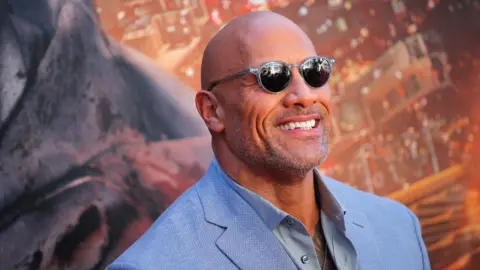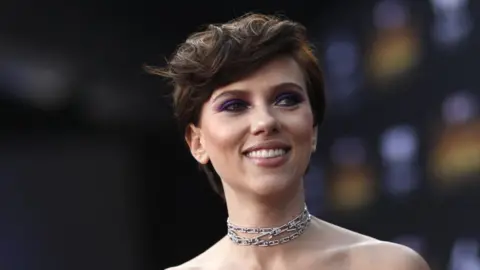Is Dwayne Johnson's disabled role in Skyscraper 'offensive'?
 Getty Images
Getty ImagesHollywood stars have been criticised for taking roles away from transgender and disabled actors. Should minorities on-screen only be represented by minority actors?
Last week, Scarlett Johansson stepped down from a role as a transgender man following a backlash from the LGBT community.
A few days later, Dwayne "The Rock" Johnson was branded hypocritical for calling for more disabled actors on-screen while also taking on the lead role of Will Sawyer - an FBI agent with a prosthetic leg - in his new film Skyscraper.
In this sensitised climate, the traditional belief that acting is founded on portraying someone you're not, is being denounced to the point of toxicity.
This certainly proved the case for journalist Daniella Greenbaum, who wrote a column for Business Insider defending Johansson's right to play a trans man.
The outrage first forced the piece offline before ultimately causing Greenbaum to resign.
In her resignation letter she defended her belief that "actors should be free to act", and warned against the "power of the mob" to transform difference of opinion into alleged bigotry.
"I believe female actors can play men and trans men," she wrote on Twitter. "That is the apparently controversial view that inspired Business Insider to take down my piece."
 Reuters
ReutersMany people agreed with her.
Given that the whole concept of acting is about putting yourself in someone else's shoes, why shouldn't such roles have gone to professional and popular actors like Johansson and Johnson?
Yet support for this viewpoint does not need to invalidate calls for increased diversity - a point Johnson used his Skyscraper role to highlight.
Disability advocate or 'part of the problem'?
As a former WWE icon and one of the most most bankable stars in Hollywood at present, Johnson's pledge of support for the Ruderman Family Foundation, a campaign group supporting disabled actors, might appear the ideal endorsement.
According to the foundation's own research, 20% of the US population have a disability, yet feature in only 2% of on-screen television roles, and of these, 95% are played by non-disabled actors.
"I certainly encourage the entire [entertainment] industry to take steps forward to audition and cast actors with disabilities to play characters with and without disabilities," Johnson said in a short video.
"Disability is an essential piece of diversity, and our characters and actors should definitely 100% reflect this."

Allow X content?

But the way Johnson went on to phrase his support, set against his role in Skyscraper, has led to accusations of "ableism" - the concept of discrimination in favour of able-bodied people.

Allow X content?

"I was honoured to play an amputee, and to make sure that I did right by them," he continued.
For comedian, actor and disability advocate Maysoon Zayid his reflections were "absurd", as he had "literally just finished taking a role from a disabled person".
Disabled actors are often rejected on the grounds they lack acting experience but, she says, are not given the opportunities to address this.
The phenomenon of able-bodied actors 'stealing' roles - or "cripping up" as Zayid calls it - is insulting in itself, but the way Johnson then had "the gall to talk about discrimination as if he wasn't part of the problem," only added insult to injury.
For Zayid, Skyscraper represents a huge missed opportunity to create an authentic disabled action hero and counter this narrative.
She dismisses claims that such a move would result in box office failure.
"Surround a disabled lead with stars and you can get the box office bang that you want.
"Make The Rock the secondary lead - there's your solution."
She adds: "I love The Rock, I was so sad to see him doing something so offensive."
But, Zayid says, change relies on actors like Johnson "realising how damaging it is" and "look at visibly disabled roles in the same way that they do race or gender".
"Otherwise, we are never going to get the high-level opportunities," she says.
'Commercial pressures'
However, the push for improved representation must be seen in a longer lens perspective, according to former actress Storme Toolis.
As the star of a viral Maltesers advert that challenged social perceptions toward disability, she says "people have to realise that diversity is a process - you can't expect it to magically change overnight".
Adopting a pragmatic approach, Toolis thinks "commercial pressures" mean the industry will always bow to "celebrity culture to promote certain people".
This is particularly true at a time when the film industry and audiences view disability as "the ultimate challenge", according to Zayin.
Allow Google YouTube content?
Three best actor winners this decade - Colin Firth, Matthew McConaughey, and Eddie Redmayne - have represented real-life men with disabilities, while this year's best picture winner and most-nominated title, The Shape of Water, starred Sally Hawkins as a mute woman.
"Do I think it's necessarily right? No," explains Toolis, who says she left the industry partly because she found herself being typecast as a disability advocate rather than for her acting.
"But equally I don't think it's fair to disregard the performances - I thought Redmayne was fantastic in The Theory of Everything.
"The pool of disabled talent is there, but it's a mutual responsibility between the casting directors, writers, producers and everybody to promote genuine disabled talent."
Representation matters
Redmayne's turn as the late professor Stephen Hawking reveals a second, concurrent debate.
Is it fair to say the potential of a disabled character to alter perceptions is stunted if they are not played by a disabled actor? Johnson stressed the need "to educate and change perceptions" by featuring actors with disabilities in a variety of roles.
The action hero shared a review by Kristen Lopez, a freelance writer for SlashFilm who uses a wheelchair, which stressed Skyscraper's representation of Sawyer's disability was positive irrespective of his involvement.
She tells BBC News the backlash should not be "laid at Johnson's feet specifically", instead reflective of a systemic failure within the industry as a whole.
Hollywood, she says, fears the majority of audiences (being able-bodied) won't relate to a disabled person "unless they know this person was once 'just like them'".
She calls this formulaic approach the "able-bodied buffer", with the actor "acting as a bridge to help the able-bodied audience understand this character".
This was reflected in praise for Skyscraper on social media:

Allow X content?
Allow X content?
Allow X content?

But Zayid says this excludes young disabled people, already starved of relatable role models.
"When young disabled people are looking at the screen and they're seeing disability and realising the disabled person representing them is nothing like them, it makes them think they can't do it and can't be it," she says.
"But with the correct accommodation we can do anything our able-bodied peers do, and we can do it more authentically as it's lived experience."
Lopez agrees but says Skyscraper progresses representation of disability by resisting inspiration porn.
"It's not going to solve or end the problems with disabled representation - we still need people with disabilities writing, directing, and starring in movies - but it's a step forward."

Follow us on Facebook, on Twitter @BBCNewsEnts, or on Instagram at bbcnewsents. If you have a story suggestion email [email protected].
